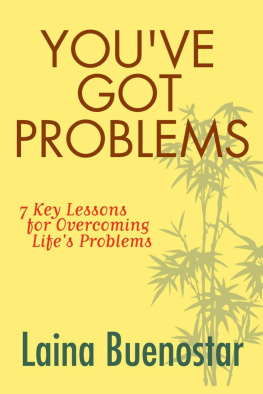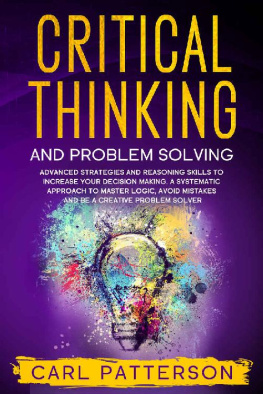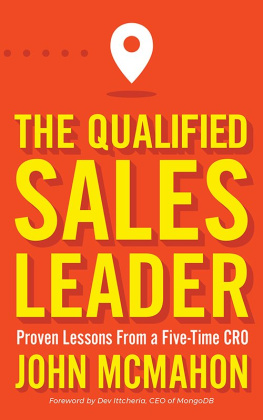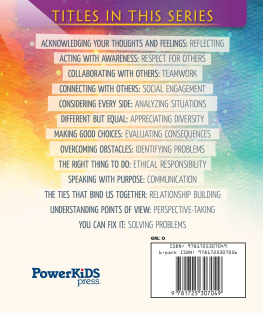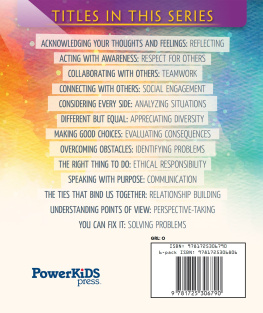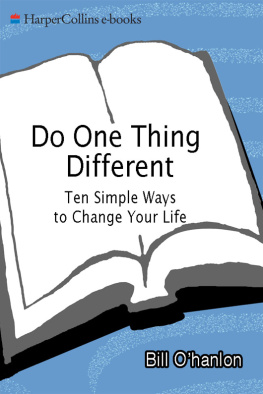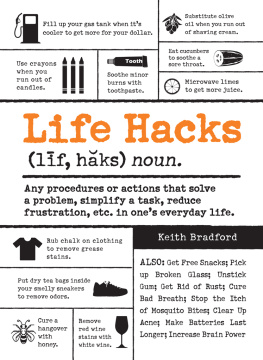Problems, Problems, Problems
If youre reading this book hoping it will give you the secret to making problems go away, youll be disappointed. There is no recipe here for a magic pill that can make frustrating situations, stressful matters and annoying people disappear from your life.
What youll find in this book are seven timeless lessons that can help you navigate through any challenging situation -- with noticeably less stress.
Why do you need to know these seven lessons? Because you should know how to face problems properly, to feel more in control, and not be overwhelmed by the situation. You have to stop doing things that worsen problematic situations, and take productive steps instead.
After reading this short book, youll begin to understand your past experiences, why you had them, and why they turned out the way they did. And with the knowledge you gain from reading this, youll be better equipped to face your current and future problems.
This book is designed primarily for handling personal and interpersonal problems, but whatever insights you get out of it can be used to deal with other kinds of problems as well.
How do you know you have a problem?
You have a problem when there is a gap between what you want to achieve and what you have, and you need to close that gap. You have a problem when something disrupts the normal state of things and you want to remove the disrupting element. You have a problem when you are in a situation that is regarded as undesirable or difficult to deal with.
The source of a problem can be a situation, an issue, an object, or a person.
Regardless of the source of conflict, whats common about problems is that they introduce to your system a feeling of discomfort, pain, stress, or irritation.
The degree by which a thing bothers you depends on whether you consider it a problem or just a minor annoyance. You can live with the latter, but you have to find a solution to the former.
Anything annoying can be a problem if you make it so. If you magnify it, blow it up many times its original size, you can create a huge problem out of it.
You can ignore a stressful situation, wishing it would go away. But most of the time, the problem wont disappear until you face it, unless you go through it.
Do problems have a purpose for visiting you? Yes. Its purpose is to show you something, to teach you things about yourself, your life, and how you are doing in your earth journey.
When a problem appears, it means you have to pay attention -- life is showing you something important.
***
There are two types of problems:
1) Problems that you can do something about.
2) Problems that you cant do anything about.
Its important that you determine first whether a problem is one that you can do something about. Finding a solution requires your energy and time, so you have to be certain that a problem is yours before you spend those two valuable resources on it.
The first type (problem you can do something about) is a problem that you can solve by doing something or by not doing something. Your action or inaction will resolve the issue and put an end to the undesirable situation.
For example, if your problem is that youre always coming to work late because you fail to wake up early, then the situation is within your control. Its a problem you can do something about. There are several solutions available for you.
The second type (problem you cant do anything about) stems from things outside of you. If the problem is your grumpy boss, then it is not within your control. You cant change another person. It is pointless for you to spend your energy and attention on making your boss more likable.
Under the second type are large-scale problems that you cant solve on your own. This includes issues such as corruption in the government, wars, epidemics, economic depression, unemployment, and law and order problems. With this type of problem, you can do your part in two ways: either by contributing to the solution or by being not a part of the problem.
There are problems that can sort themselves out if you leave them alone. For this type of problems, just let time pass and youll eventually see its not a problem anymore.
***
Determine if a problem is really your problem. Otherwise, you would just be misusing your time and energy. Im talking here about problems that you think and believe are your problems, but in truth are really none of your business. An example of this is when a person you love is into some sort of addiction, or is in a bad relationship, and very clearly is suffering.
You cant solve a problem like that, because the other person has a will of his own. He has to make his own decisions based on what he needs to experience at that particular point in his life, and you must respect his choices.
The only thing you should do is to support this person in any way you can. You can offer advice, you can offer help, you can listen, you can offer anything, but it is not your responsibility to make life decisions for them.
Why? Because youre not supposed to solve their problems for them. Just like you, they must learn and experience things that are necessary for their journey. Do not deprive them of the chance to figure things out for themselves.
What if its a matter of life and death? Lets say someone is suicidal? Of course, you can intervene because obviously that person is not thinking anymore. He may not be in his right mind, and thus unable to make informed decisions.
***
One very important thing to remember is that the way you view your life is colored by how you interpret things. In other words, the meaning you give something affects how you experience that thing.
Like I said earlier, you can create a problem out of a minor annoyance. The meaning you give a thing determines whether it is a problem to you or just an inconvenience.
The way you define things in a certain situation is very important because your interpretation affects how you perceive the situation and also how you respond to it.
If you think that your husband talking to your sexy new neighbor is a problem, then it is really a problem.
A different person who doesnt perceive something like that as a threat wont see it as a problem that needs to be resolved.
If Bob sees his wife laughing with her co-worker and it looks like he is flirting with her, Bob can choose what meaning to ascribe to that scene. He decides whether his wife is flirting back, or she is just being her friendly self.
If Bob thinks she is flirting with the male friend, and Bob sees that as a problem, then he has a real problem. He can make a mountain out of that molehill. He can fight with his wife, he can punch the other guy, he can do many things. It all depends on what meaning he gives to what he sees.
On the other hand, he can dismiss the scenario and continue to trust his wife. (But if there are visible, indisputable evidence or red flags supporting his negative suspicion, then he must be vigilant. He must find out more.)
The way he defines his relationship with his wife will play a huge role in how he reacts to the situation. If he knows his wife well, and he is certain she is faithful, and she has been faithful all their life together, then he should not have any doubts about her fidelity.
So remember that the meaning you give to an object, a situation, an issue, or an event is very important. The label you give them sets the course for how things play out further.
In the following pages, I will give you the seven key reminders that should help you properly deal with problematic situations and resolve them successfully.

